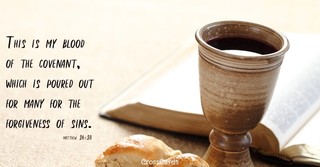
- Recent Translations
- All Translations
Matthew 26:29
Share
Settings
Images for Matthew 26:29

Matthew 26:29 Meaning and Commentary
But I say unto you, I will not drink henceforth
From whence it seems natural to conclude, that Christ had drank of the cup in the supper, as well as at the passover; and it is reasonable to believe, that he also ate of the bread; since it appears from what has been observed before, (See Gill on Matthew 26:26), that none might eat, till he that blessed and brake the bread had tasted of it F6: the reason why wine is here called
the fruit of the vine, and not wine, (See Gill on Matthew 26:27). The design of this expression is to show, that his stay would be very short: the cup he had just drank of, was the last he should drink with them: he should drink no more wine at the passover; he had kept the last, and which now of right was to cease; nor in the Lord's supper, for though that was to continue to his second coming, he should be no more present at it corporeally, only spiritually; nor in common conversation, which is not contradicted by ( Acts 10:41 ) . Since, though the apostles drank with him in his presence, it does not necessarily follow, that he drank with them; and if he did, it was not in a mortal state, nor in the ordinary manner and use of it, but to confirm his resurrection from the dead, nor can it be proved that he drank of the fruit of the vine: the design of the phrase, as before observed, is to signify his speedy departure from his disciples. The allusion is to an usage at the passover, when after the fourth cup, they tasted of nothing else all that night, except water; and so Christ declares, that he would drink no more, not only that night, but never after.
Until the day I drink it new with you, in my Father's kingdom:
Mark says, "in the kingdom of God", ( Mark 14:25 ) ; and Luke, "until the kingdom of God come", ( Luke 22:18 ) ; and both the Syriac and Persic versions read it here, "in the kingdom of God"; by which is meant, something distinct from the kingdom of the Son, or of the Messiah, which was already come; and appeared more manifestly after the resurrection of Christ, upon his ascension to heaven, and the effusion of the holy Spirit, and the success of the Gospel, both among Jews and Gentiles; and which will be more glorious in the latter day: and when all the elect of God are gathered in, and have been presented to Christ by himself, he will then deliver up the kingdom to the Father, and God shall be all in all; and then the kingdom of the Father will take place here mentioned, and which is no other than the ultimate glory; so called, because it is of the Father's preparing and giving, and in which he will reign and dwell, and the saints with him, to all eternity; which must not be understood to the exclusion of Christ, for it is called his kingdom also, ( Luke 22:30 ) , in this state, Christ will drink new wine, not literally, but spiritually understood; and which designs the joys and glories of heaven, the best wine which is reserved to the last: which is sometimes signified by a feast, of which wine is a principal part; by sitting down as at a table, in the kingdom of heaven, with Abraham, Isaac, and Jacob, ( Matthew 8:11 ) , and expressed by "wine", because of its refreshing and exhilarating nature, in God's presence is "fulness of joy"; and by "new wine", because these joys are the most excellent, because they are always new, and never change; they are "pleasures for evermore": to "drink" hereof, denotes the full enjoyment of them, which Christ, as man and mediator, and his people with him, shall be possessed of; and is different from the superficial "taste of the powers of the world to come", ( Hebrews 6:5 ) , which hypocrites have, and those real prelibations of glory which saints have in this life; there being a difference between drinking and tasting, ( Matthew 27:34 ) , and this will be social; Christ and his true disciples shall be together; and drink this new wine together; or enjoy the same glory and felicity in the highest measure and degree, they are capable of; and which society therein will yield a mutual pleasure to each other, as the words here suggest. The Jews often express the joys of the world to come, by such like figurative phrases: they make mention of, (ytad amled Nyy) , "the wine of the world to come" F7; and of (ynxwr rkv) , "a spiritual drink", in the last days, which is called the world to come F8: and so they explain F9 after this manner, ( Isaiah 64:4 ) . "Neither hath the eye seen, O God", (Nyy hz) , "this is the wine", which is kept in the grapes from the six days of the creation; of which they often speak in their writings F11
F6 Maimon. Chametz Umetzah, c. 8. sect. 10. Piske Toseph. Pesach. art. 328.
F7 Zohar in Lev. fol. 17. 2.
F8 Tzeror Hammor, fol. 3. 4. En Israel, fol. 30. 1.
F9 T. Bab. Berncot, fol. 34. 2, & Sanhed. fol. 99. 1.
F11 Targum in Cant. viii. 2. Zohar in Gen. fol. 81. 4. Tzeror Hammor, fol. 30. 3.